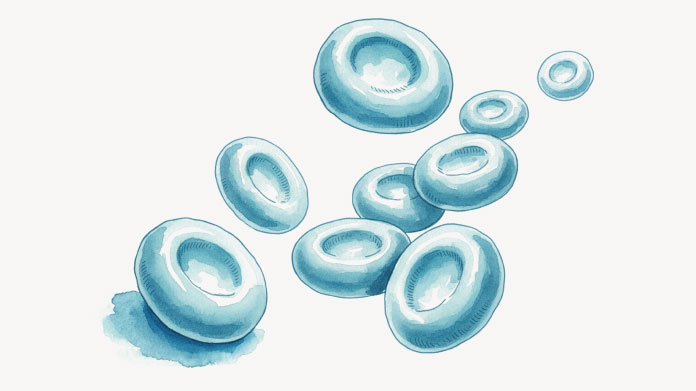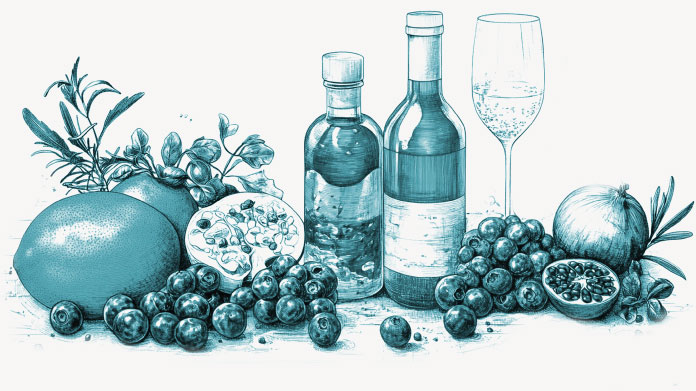10 tips for fighting oxidative stress and free radicals
Accelerated ageing of the skin, joints, and hair, plus fatigue, etc … your body is at risk from oxidative stress. The good news is there are ways you can protect yourself.

Oxidative stress: definition, causes, consequences
Throughout life, our bodies generate free radicals as a by-product of breathing and metabolising nutrients from food for energy (1) .
These molecules are sometimes referred to as ‘wayward’ because, as a result of the above chemical processes, they lose an electron which makes them unstable. In order to re-stabilise themselves, free radicals tend to ‘steal’ electrons from healthy cells, thus turning them into free radicals, and so on and so on. This process is known as oxidative stress (2) and it destroys cells.
In theory, if your body is in a state of equilibrium, and functioning in a healthy environment, it should produce a sufficient amount of antioxidants, with the rest provided by your diet.
The problem comes when your environment and diet not only fail to supply sufficient antioxidants, but also promote oxidative stress, resulting in an acceleration of the ageing process. So what can you do?
Reduce your alcohol consumption
Alcohol is metabolised in the body in two main ways: by enzymes called alcohol dehydrogenases (ADH) and by the microsomal ethanol oxidising system (MEOS) (3).
It’s this second way of processing alcohol in the body that can lead to free radical production which threatens cellular health, especially in the liver (4).
To make matters worse, alcohol makes the body’s cellular defence systems less effective against free radicals.
It’s no surprise, then, that reducing alcohol consumption, and in particular, avoiding binge drinking, is one of the most important strategies for fighting oxidative stress.
Cut down or quit smoking
While smoking has immediately visible effects on skin health (sagging, yellowing, etc.) primarily because of damage caused to the skin’s micro-vessels, it also promotes constant oxidation of cells, by adversely affecting cellular respiration.
In addition, smoking weakens the immune system and cellular defence systems.
These harmful effects of smoking are responsible for an increase in cellular oxidative stress (5). Thus, as well as causing cardiovascular disease and various types of cancer, smoking promotes the generation of free radicals and oxidative stress.
So do yourself a favour and stop smoking, or at least try to cut down as much as possible.
Consume turmeric
Some foods in particular, are known for helping to protect cells against oxidative stress. One such dietary is turmeric, a spice that’s popular both in cooking and in Ayurvedic medicine.
Good to boost immunity and the upper respiratory tract, turmeric contains curcuminoids, active ingredients with considerable capacity for absorbing free radicals (6). So to increase your turmeric intake, make sure you choose a supplement standardised in curcuminoids (such as Super Curcuma).
Reduce your stress levels
As we’ve seen, the term oxidative stress describes a situation of duress at a cellular level and should not be confused with psychological stress.
However, psychological stress does have an impact on the health of our cells. To help ‘manage’ stress, our bodies produce a number of hormones: cortisol, adrenaline, endorphins, serotonin.
It’s an explosive and effective cocktail, but it does have a downside. When these hormones are broken down, it results in the release of free radicals, and there’s therefore a direct link between the stress we experience and oxidative stress.
Though ‘reducing stress’ is easier said than done, effective techniques do exist. The mindfulness meditation and cardiac coherence etc., explored in our article 8 natural ways to calm an anxiety attack , are also effective ways of dealing with the stresses of everyday life.
You can also take an extract of Griffonia simplicifolia, an African shrub rich in a precursor of serotonin which supports healthy nervous system function (and which you’ll find in our supplement 5 HTP).
Eat a balanced diet
A key external source of oxidative stress is an unhealthy diet: too much fat, sugar and salt. While enjoying the occasional pizza is fine, eating this kind of food all the time will only serve to increase free radical production. The same goes for processed food.
And what we choose to eat is all the more important because the body’s first resource for fighting oxidative stress is precisely our diet. Adopting an acid-base diet, or even a paleo diet is a good way of boosting your body’s defences against free radicals.
Trust in vitamin E and minerals
Both the types of diet mentioned above are high in:
- walnuts, almonds, peanuts, hazelnuts, other nuts and oilseeds, all rich in vitamin E, which helps protect cells against oxidative stress (and which you’ll find in the supplement Annatto Tocotrienols) (7) ;
- oily fish: oysters, tuna, herrings, sardines, etc, rich in selenium and zinc, which also provide cells with protection against oxidative stress(8-9).
To obtain the benefits of vitamin E, selenium, and zinc, as well as manganese all in one go, you could opt for a multivitamin supplementDaily 3 or its sister product Daily 1, where you only need take one tablet a day).
Try to sleep well
Sleep has restorative effects on the body – it’s a fact. Recent studies have even shown that sleep has antioxidant benefits: it boosts our cells’ defences against oxidative stress.
Conversely, a lack of sleep not only produces biological effects similar to those caused by stress, but it also induces stress, creating a positive feedback loop – in other words, a vicious circle (10).
Ensuring good quality sleep is therefore essential for fighting oxidative stress. Adopting a few simple measures can help if you’re experiencing sleep problems:
- no caffeine, theine or other stimulants after 4pm;
- no intensive exercise (long runs, weight training, cross-fit, etc) after 8pm;
- no ‘screen time’ after 10pm;
- establish a routine;
Take moderate exercise
Though it seems counter-intuitive, too much exercise appears to be almost as bad for our health as too little!
In a previous article on this subject (Does exercise really strengthen the immune system?), we discussed how moderate exercise, with at least one day of recovery between each session, boosts the immune defences. However, too much exercise has precisely the opposite effect.
- our bodies naturally produce free radicals as a by-product of metabolising nutrients for energy;
- exercise increases the body’s energy needs, and thus metabolism;
- exercise is therefore responsible for inducing significant free radical generation.
This increase in free radicals is not a problem as long as the exercise is at a moderate level as it is offset by improvements to the immune system.
But when that exercise is too frequent and intense, it not only promotes the production of free radicals but it also has a negative effect on the immune system. It’s another vicious circle (11).
So make sure you apply moderation when it comes to exercise and always factor in enough recovery time.
Benefit from the virtues of the grapevine
Another of nature’s health aids is the grapevine (Vitis vinifera), rich in polyphenols such as resveratrol, an excellent substance widely-studied by scientists for its ability to trap free radicals.
You can find this substance in the form of a dietary supplement (for example Resveratrol, composed of high-dose vine extracts and Polygonum) (12).
Ventilate your home regularly
Atmospheric pollutants have the same negative effects on our body as smoking and alcohol: they impair cellular respiration and encourage the production of free radicals while at the same time reducing the resistance of our cellular defences to these attacks (13).
It’s therefore important to limit the build-up of pollutants as much as possible inside your home. The best way to do this is to air it daily for at least 10 minutes, in summer and winter alike.
To help in your fight against oxidative stress, you can also use air-purifying plants to boost the effects of ventilation and ensure healthy indoor air quality.
References
- MOSKOVITZ, Jackob, YIM, Moon Bin, et CHOCK, P. Boon. Free radicals and disease. Archives of Biochemistry and Biophysics, 2002, vol. 397, no 2, p. 354-359.
- SIES, Helmut, BERNDT, Carsten, et JONES, Dean P. Oxidative stress. Annual review of biochemistry, 2017, vol. 86, p. 715-748.
- CRABB, David W., BOSRON, William F., et LI, T.-K. Ethanol metabolism. Pharmacology & therapeutics, 1987, vol. 34, no 1, p. 59-73.
- NORDMANN, Roger, RIBIÈRE, Catherine, et ROUACH, Hélène. Alcool et radicaux libres: données actuelles. 1988.
- BASKARA-YHUELLOU, Indoumady. Effet de l'exposition à la fumée de cigarette sur le profil oxydatif et la sénescence des différentes sous-populations lymphocytaires T CD4+. 2013. Thèse de doctorat. Université Paris-Est.
- MIQUEL, J., BERND, A., SEMPERE, J. M., et al.The curcuma antioxidants: pharmacological effects and prospects for future clinical use. A review. Archives of gerontology and geriatrics, 2002, vol. 34, no 1, p. 37-46.
- NIKI, Etsuo et NOGUCHI, Noriko. Dynamics of antioxidant action of vitamin E. Accounts of chemical research, 2004, vol. 37, no 1, p. 45-51.
- TINGGI, Ujang. Selenium: its role as antioxidant in human health. Environmental health and preventive medicine, 2008, vol. 13, no 2, p. 102-108.
- POWELL, Saul R. The antioxidant properties of zinc. The Journal of nutrition, 2000, vol. 130, no 5, p. 1447S-1454S.
- GOPALAKRISHNAN, Anupama, JI, Li Li, et CIRELLI, Chiara. Sleep deprivation and cellular responses to oxidative stress. Sleep, 2004, vol. 27, no 1, p. 27-35.
- HADŽOVIĆ-DŽUVO, Almira, VALJEVAC, Amina, LEPARA, Orhan, et al.Oxidative stress status in elite athletes engaged in different sport disciplines. Bosnian Journal of Basic Medical Sciences, 2014, vol. 14, no 2, p. 56.
- JAYAPRAKASHA, Guddadarangavvanahally K., SINGH, R. P., et SAKARIAH, K. K. Antioxidant activity of grape seed (Vitis vinifera) extracts on peroxidation models in vitro. Food chemistry, 2001, vol. 73, no 3, p. 285-290.
- LODOVICI, Maura et BIGAGLI, Elisabetta. Oxidative stress and air pollution exposure. Journal of toxicology, 2011, vol. 2011.
Keywords
1 Days
Trustworthy company with tested products
Trustworthy company with tested products
Trusted
5 Days
Efficiency and speed
Efficiency and speed
Cuccie
7 Days
GOOD BRAND IN FOOD COMPLEMENTS
GOOD BRAND IN FOOD COMPLEMENTS - SERIOUS WITH GOOD DOCUMENTS AND DETAILS SCIENTIST. AND SERIOUS HONNEST COMMERZIALISATION. I HAVE TRUST IN THEIR PRODUCTS.
FENOGLIO Guy
8 Days
Very good experience
Very good experience, the products arrived in time, in perfect condition and are good quality. Thank you.
GABI TIRCOCI
14 Days
very good expereince
very good expereince
Jelena Đaković
14 Days
Very good products.
Very good products.
Agnes BENDSAK
16 Days
Just OK
Just OK, ordering from company for many years and being safisfied
Lynn Mae
17 Days
Recomendo
Produtos encomendados são recebidos atempadamente e de acordo com o anunciado! Muito satisfeita!
Carla Sofia
17 Days
Everything is great!
Everything is great!
Jonas
22 Days
The delivery was fast and the product…
The delivery was fast and the product is great
SOMMARIVA Gianni
23 Days
Great service and lots of information
Great service and lots of information
Gabi
26 Days
Service Satisfaction
I’m satisfied with the service; it fulfilled what it set out to do.
Anfhony Abreu
29 Days
Original product and fast delivery
Original product and fast delivery. I haven't started it yet, but will do soon.
Vincenza Catania
32 Days
Good quality
Good quality. Good service.
Leonel Guzman
34 Days
Top!!!!!!!!
Top!!!!!!!!
Michael
of experience
your money back
##montant## purchase




